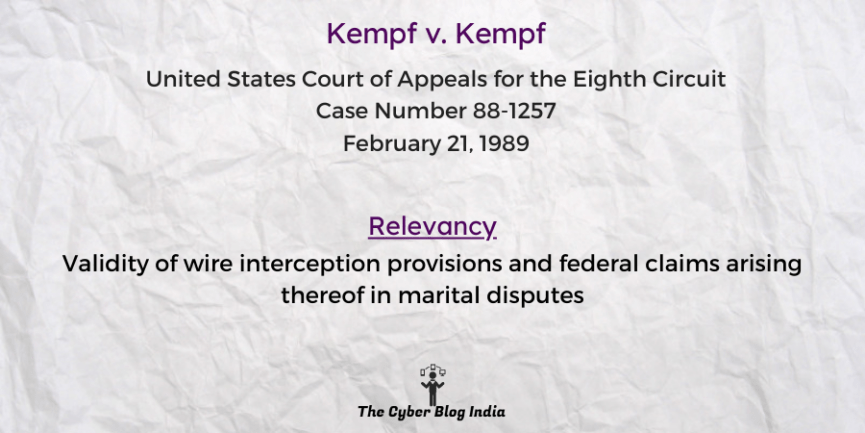Kempf v. Kempf

Kempf v. Kempf
868 F.2d 970 : 57 USLW 2564
In the United States Court of Appeals for the Eighth Circuit
Case Number 88-1257
Before Senior Circuit Judge Ross, Circuit Judge Heaney, and Circuit Judge Bowman
Decided on February 21, 1989
Relevancy of the Case: Validity of wire interception provisions and federal claims arising thereof in marital disputes
Statutes and Provisions Involved
- The Omnibus Crime Control and Safe Streets Act, 18 U.S.C. §§ 2510-2520
Relevant Facts of the Case
- During their marriage, the appellee (husband) suspected that the appellant (wife) was having an extramarital affair.
- He intercepted and recorded her telephone conversations between June 04, 1985, and August 09, 1985. He connected a cassette tape recorder to an extension phone’s receiver in their basement.
- When the husband filed for the dissolution of marriage, he used the recorded tapes as evidence. Eventually, the state circuit court dissolved the marriage in May 1987.
- In June 1987, the wife filed an action against the husband before the District Court for illegal wiretapping. However, the court, relying on Simpson v. Simpson, held that interspousal wiretapping within the marital home is not a violation of existing laws.
Prominent Arguments of the Counsels
- The appellant’s counsel argued that Section 2511(1) clearly proscribes the husband’s conduct. This provision prohibits interception, use, or disclosure of wire communications by any person except as given in the statute. Further, Section 2520 provides a cause of action to any person who is a victim of a Section 2511 violation.
Opinion of the Bench
- Federal courts have usually left the issues of domestic disputes for state courts to deal with and adjudicate upon. However, the District Court’s reliance on the Simpson case is where this court does not agree with.
- The remedy available in Section 2520 applies to any person as defined as any individual.
- In Pritchard v. Pritchard, the court has noted that there is no express or implied exception for willful, unconsented electronic surveillance between spouses.
- The District Court’s interpretation of the statute contradicts the Second, Fourth, and Sixth Circuits’ interpretations.
Final Decision
- The court reversed the District Court’s judgment and remanded the case for further proceedings.
